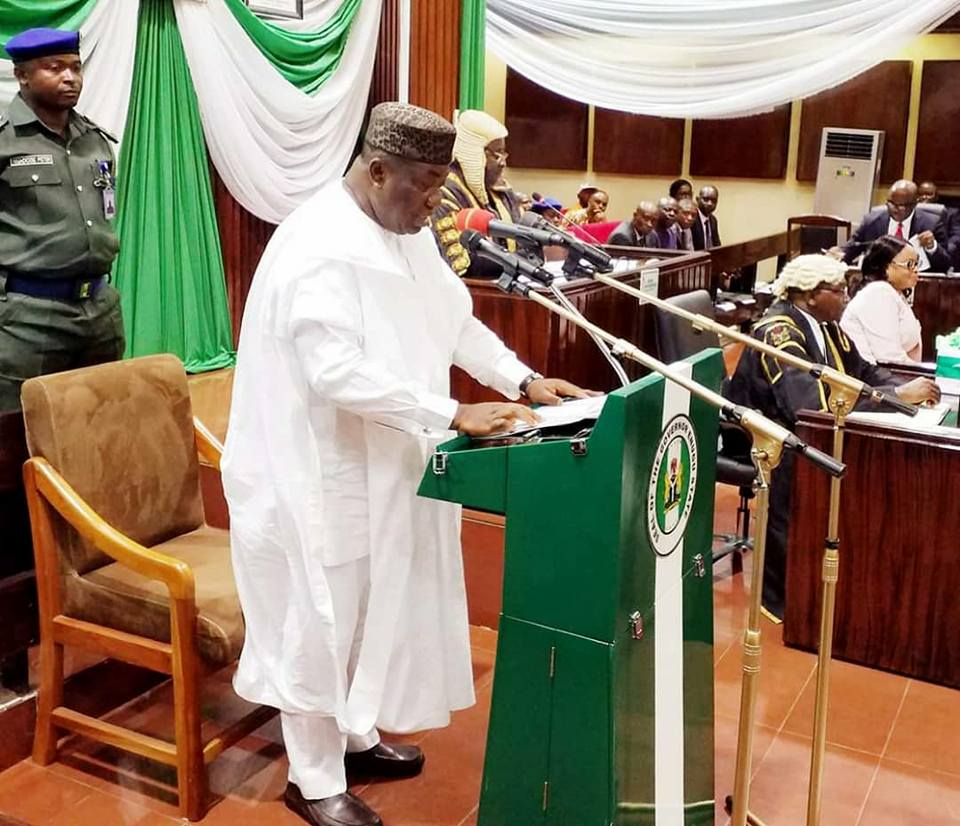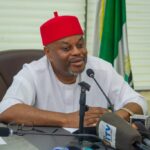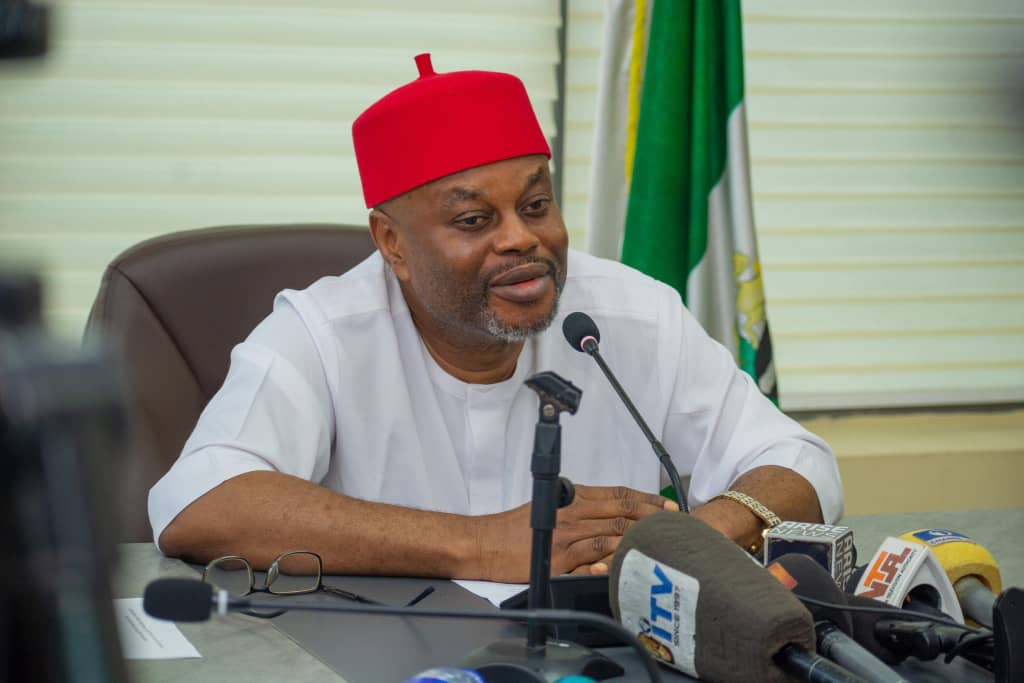 Since the dawn of democracy as we know it in Nigeria, all we have done is go from one form of bad leadership to the other, with the people always getting the short end of the stick and being short-changed at will by a few who feel that, even after their election and emergence to lead, they do not owe the people any explanation for their under-performance or complete lack of it.
Since the dawn of democracy as we know it in Nigeria, all we have done is go from one form of bad leadership to the other, with the people always getting the short end of the stick and being short-changed at will by a few who feel that, even after their election and emergence to lead, they do not owe the people any explanation for their under-performance or complete lack of it.
With the emergence of governors like Ifeanyi Ugwuanyi (Enugu), Dave Umahi (Ebonyi), Ibrahim Hassan Dankwambo (Gombe), amongst others, Nigerians have begun to demand more from their leaders and the ones who mean well for the people have always stood out and counted themselves worthy to serve by rendering account of their stewardship to the best of their abilities.
This is not a piece about Dankwambo or Umahi – who have been extremely judicious in the use of resources at their disposal – but a focus on the man who is fondly called ‘Gburugburu’ and how he has applied some forward-thinking to his style of governance to win the hearts of the people in the state who have, in turn, endorsed him for a second term in office in 2019.
Since his emergence almost four years ago, at every turn, Ugwuanyi has disclosed his administration’s plan to adopt new strategies towards stepping up actions that would meet the developmental needs of the people of the State.
Ugwuanyi’s administration has in the last three years spent over N45 billion on road construction and rehabilitation across the length and breadth of the state, covering about 300 kilometres.
Through his administration’s peace and grassroots development initiatives, Gov. Ugwuanyi has initiated and prosecuted well-thought-out people-oriented programmes that are ideological and germane to the future of the citizens of the state. The programmes are also conceptualized to directly impact positively on the lives of the masses to give them a sense of belonging, as the true heroes of democracy.
Gov. Ugwuanyi has through his human capital empowerment programmes and special interventions aimed at improving the living standard of the lowly, long neglected and under-privileged, ensured that dwellers who had been hitherto denied access to basic amenities; qualitative and affordable education, healthcare delivery, among others, are remembered.
For instance, in line with his administration’s educational policy and the need to discover and assist under-privileged intellectuals, especially in the rural areas to further their studies, Gov. Ugwuanyi granted scholarship to 340 indigent students of the state’s Polytechnic in Iwollo, Ezeagu Local Government Area.
Few weeks after, the same gesture was extended to 340 students of the Institute of Management and Technology (IMT), Enugu, totaling 680 students within one month. It is interesting to note that the scholarship, which covers the beneficiaries’ tuition fees for four years of academic studies, was spread across the 17 local government areas of the state, which enable 40 students per council from the two institutions to benefit, accordingly.
Also Gov. Ugwuanyi recently extended his milk of human kindness to 95 widows of fallen heroes of the Nigerian Army, residing in Abakpa and Awkunanaw barracks, Enugu, who are predominantly non-Igbos, through a N19.6 million empowerment grant to assist them start businesses of their choice to ameliorate the hardship they had encountered as a result of the death of their husbands.
Another commendable legacy of Ugwuanyi’s administration is the recent integration of faith-based organizations’ facilities into the Free Maternal and Child Health programme of the state to deliver more medical services in the rural areas. What it simply implies is that pregnant women and children under five, who hitherto had no means of treating their health challenges, can now access free medical treatments at the faith-based organizations that have health centres and hospitals in their areas, courtesy of the state government’s new programme…all in a bid to reduce the rate of maternal and child mortality rate in the state.
Of all these, the move which has galvanises support for Ugwuanyi the most is the ‘One Community, One Project’ which has seen each autonomous community in the state get the sum of N10milion for a variety of projects in their locale, in order to show government presence.
Through the Enugu State Universal Basic Education Board (ENSUBEB), the state government has constructed and renovated over 300 primary and secondary classroom blocks across the state. Interestingly, contract for the construction and reconstruction of another set of 208 structures, worth of over N2.5 billion was recently awarded by the state government and one is glad to note that works have commenced, accordingly. It is also pertinent to note that the administration has recruited the highest number of primary and secondary school teachers ever in the history of the state, among others.
According to the World Bank Group, Enugu State as the second most advanced state in Nigeria towards the frontier of global best practices, with regards to Ease of Doing Business. The objective rating, which was contained in the recently released World Bank Doing Business in Nigeria 2018 report, by implication, proves that Enugu State, under the visionary leadership of Gov. Ugwuanyi has institutionalized far-reaching socio-economic reforms and provided critical infrastructure and security that have engendered a robust climate of Ease of Doing Business, creating an increased inflow of local and foreign direct investments in the state. It has also gone a long way to showcase the ingenuity of the present administration in advancing the cause of business engagements in the state through innovations, accountability, fiscal discipline and efficient public expenditure management for the overall wellbeing of the masses.
Over the course of the last three year, the administration of Ugwuanyi has raised the bar in both infrastructural and social development, leaving indelible marks on the citizens of the state, as well as entrenched peace, political stability and good governance – all of which can be attributed to the boosting of the state’s internally-generated revenue (IGR) base.
Prior to the recent World Bank rating, Gov. Ugwuanyi’s administration had received an avalanche of similar verdicts and commendations from well-respected bodies. These include the Senate on the judicious utilisation of the bailout funds; the BudgIT report, which listed Enugu, Lagos and Rivers as the only three states out of the 36 states of the federation that have fulfilled obligations to their workers; the recent Economic Confidential magazine verdict that listed Enugu among the seven states that are solvent with impressive over-30 per cent Internally Generated Revenue (IGR) to fund additional economic activities.
The state is also the fifth most competitive state in Nigeria, according to the National Competitiveness Council of Nigeria; the third most debt-sustainable State in Nigeria; the first state in Nigeria to publish its Audited State/Final Account for three consecutive years; first in the South East geo-political zone and ninth in the country based on IGR as against Federal Allocation; one of the 12 states in Nigeria that can survive without federal allocations, among others.
It is easy to wave off Ugwuanyi’s achievements as “one of those gimmicks” but his current announcement as the 2018 SUN Governor of the Year and the Vanguard Governor of the Year is something to ponder on, if nothing else.
From the point of ideology, Ugwuanyi’s approach clearly underscores his sense of direction, vision, charisma and passion for the well-being of the lowly and less privileged. Where do I start? Going further will expose my mental faculty to recall the incalculable milestone achievements of a quintessential governor, Ugwuanyi. Better still, I can only described him as an embodiment of promises fulfilled. Let’s move to the next level, he deserved a second term.









